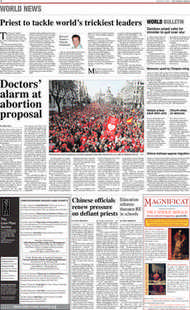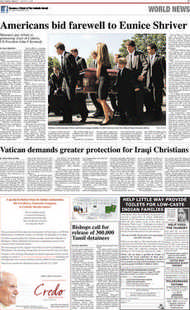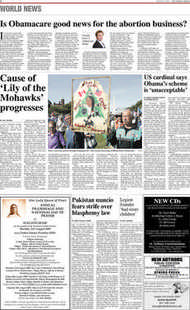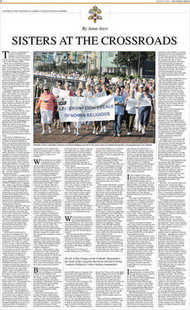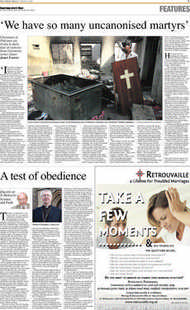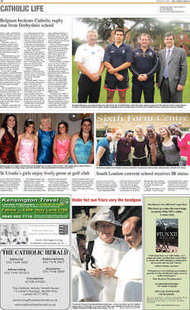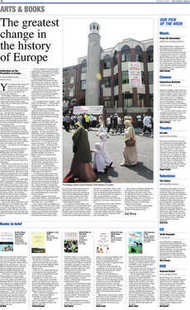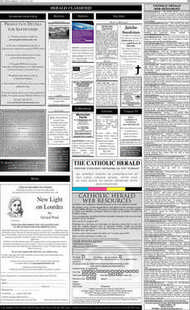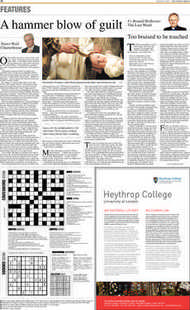Page 3, 21st August 2009
Page 3

Report an error
Noticed an error on this page?If you've noticed an error in this article please click here to report it.
Tags
Share
Related articles
Marriage Care Sparks Row With Nfp Claims
Divorce More Harmful Than Drugs, Warn Headteachers
National Marriage Week Under Political Cloud
Court Victory Casts Doubts Over Policy
Archbishop Brands Anti-family Lobby 'stupid'
Family trust attacks Marriage Care’s sex education manual
BY SIMON CALDWELL
THE HEAD of a charity set up to carry out research into the causes and consequences of family breakdown has launched a ferocious attack on Marriage Care for allegedly encouraging sexual activity among teenagers.
Norman Wells, director of the Family Education Trust, severely criticised the Catholic organisation’s sex education manual for Catholic schools and colleges.
He said that the resource “demonstrates a clear commitment to relativism” in its approach to sexual activity, contraception and sexually transmitted diseases. “It sets out to enable young people to ‘clarify their own sexual values’ – a phrase which means that there is no such thing as absolute right and wrong when it comes to sexual expression, but that young people must decide what is right ‘for them’,” said Mr Wells.
“In line with Marriage Care’s abandonment of absolute moral principles, the materials equate ‘long-term relationships’ with marriage at several points, refer to ‘safe sex’ in the context of a lesson on contraception, and commend the websites of groups such as the Family Planning Association, the Terrence Higgins Trust, and the London Lesbian and Gay Switchboard as helpful sources of information.
“The lesson for 11 to 14-yearolds on contraception and sexually transmitted infections speaks of equipping young people to make ‘informed choices’. But that is a thoroughly inadequate and unworthy goal because it allows for young people under the age of consent to make the ‘informed choice’ of engaging in unlawful intercourse just as much as it allows them to make an ‘informed choice’ to wait.
“The advocates of ‘informed choice’ are setting their sights far too low. It is not ‘informed choices’ we should be aiming for, but wise, moral and lawful choices.” Mr Wells added: “Young people need moral direction, yet in the name of non-judgmentalism. Marriage Care’s approach threatens to abandon young people to the shifting sands of relativism and deprive them of the moral compass they so desperately need.” The manual, called Foundations for a Good Life, is designed to help to teach pupils and college students about relationships, marriage, the family and sexuality.
A disclaimer in the manual states that Marriage Care “is in no way promoting the use of any method or effectiveness of any organisation or agency referred to”.
Joe Mannion, the charity’s director of relationship support, said he did not know which organisation provided the information.
The manual has previously drawn criticism for failing to focus on the morality of contraception, discussing only the methods and their effectiveness.
But the manual hails condoms as 98 per cent effective in avoiding pregnancy, and the Pill, the coil and hormonal injections as 99 per cent effective, while saying that NFP methods are far less reliable – a claim described by critics as “misleading” and “seriously inaccurate”.
Terry Prendergast, the chief executive of Marriage Care, last month caused an outcry when he said that marriage is no better for children than families based around gay or cohabiting couples.
It is understood that the Catholic bishops have since offered evidence to Mr Prendergast to show why marriage is the best arrangement in which to raise children.
Marriage Care is registered with the Charity Commission as Catholic Marriage Care Limited and many of its 80 locations are listed in the Catholic Directory of England and Wales.
The charity has an annual income in the region of £900,000, about 10 per cent of which comes from diocesan grants. Its president is Archbishop Vincent Nichols of Westminster.
Besides producing educational materials, Marriage Care is used by the bishops to prepare Catholic couples for married life. It also runs a relationship counselling service for couples in crisis.
Auxiliary Bishop John Hine of Southwark, chairman of the bishops’ committee for marriage and family life, declined to comment.
blog comments powered by Disqus





